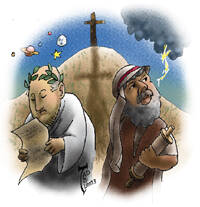Fools for God
How foolish is the Gospel? Today’s reading from the First Letter to the Corinthians begins: “For Jews demand signs and Greeks look for wisdom, but we proclaim Christ crucified, a stumbling block to Jews and foolishness to Gentiles.” Does this mean that the Gospel should look irrational or make people stumble? Isn’t wisdom supposed to be the refulgence of the divine light and image of God’s goodness (Wis 7:26)?
Surely Paul means that conventional wisdom is upended by the Gospel. There is something about the Gospel that turns our normal patterns of understanding inside out. In this same section of the letter, Paul reminds his readers, “Not many of you were wise by human standards, not many were powerful, not many were of noble birth. Rather, God chose the weak of the world to shame the strong…” (1:26-27). What seems impressive or valuable to the world does not appear that way to God. Jesus upends conventional wisdom all the time, with sayings like “Blessed are the poor in spirit” and “Whoever finds his life will lose it, and whoever loses his life for my sake will find it” (Mt 5:3, 10:39).
Jesus is anything but a conformist. Instead of embracing cultural assumptions, he does or says the opposite. This is what happens in the Gospel reading. “Jesus went up to Jerusalem. He found in the temple area those who sold oxen, sheep and doves, as well as the money-changers seated there.” Jesus drove them out, overturning the moneychangers’ tables as he went. “Take these out of here,” he demanded, “and stop making my Father’s house a marketplace.”
The practice of buying and selling in the temple area was not considered blasphemous, and perhaps it was even imagined pious. After all, it is safe to assume this was taking place in the outer court, where even Gentiles were free to walk. And since pilgrims would have needed sacrifices, one might argue that the merchants were providing a service for good religious causes. Further, since the law forbade graven images, didn’t Roman coins with Caesar’s image have to be exchanged? Conventionally, it all made sense.
But the temple was supposed to represent God’s assured presence to Israel. Consider: “One thing I ask of the Lord; this I seek: To dwell in the Lord’s house all the days of my life” (Ps 27:4). The Gospel tells us that the disciples will later see Jesus’ prophetic act as fusing with the Psalmist’s profound expression of faith: “Zeal for your house will consume me” (Ps 69:9). In hindsight it is especially easy to see that human conventions can blind us to spiritual truths. What seemed legitimate really profaned what was holy.
When the authorities demanded a sign for Jesus’ authority to do such a thing, he again upended their conventional way of thinking. “Destroy this temple and in three days I will raise it up.” They imagined bricks and mortar, “but he was speaking about his body.” The risen Christ is the ultimate countersign in a world where death is imagined to be final. He is the new presence and visible symbol of God. It seemed like foolishness to them. Their conventions blinded them to the truth.
The Gospel is neither irrational nor absurd. Yet it can seem so to a world filled with fear, grasping and narcissism. The U.S. bishops’ peace pastoral is one of the sanest documents I have ever read. It was denounced as naïve by a world committed to realpolitik. The teaching that the world’s goods are intended for all and that the common good trumps private property are profound truths. Yet the last two popes have been demonized for insisting on them. The intrinsic value of human life is an obvious divine imperative, yet it appears negotiable to the majority of Americans.
Catholics have long been fully integrated in society. The great danger is that our faith could become little more than a quaint accent to a culturally co-opted faith. We could stand to look a little foolish.
This article also appeared in print, under the headline “Fools for God,” in the March 5, 2012, issue.








